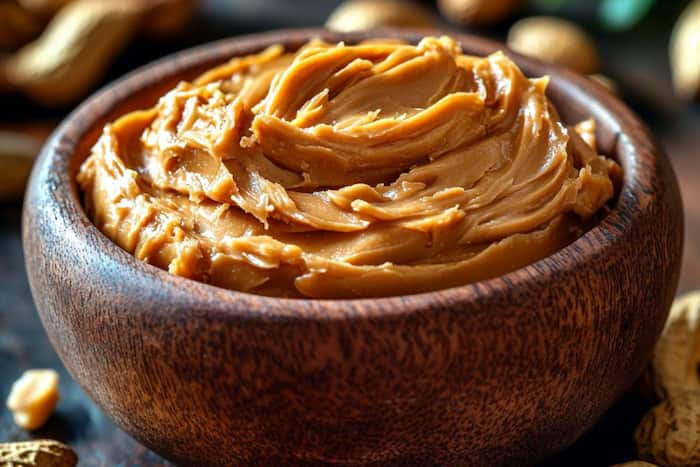Peanut butter is a nutrient-rich spread packed with protein, healthy fats, and essential vitamins. It supports heart health, boosts energy, and aids in weight management by keeping you full longer. With antioxidants like vitamin E and resveratrol, it reduces oxidative stress. Its magnesium and phosphorus content strengthen bones, while niacin and vitamin B6 improve brain function. The spread also enhances skin health, regulates blood sugar, and boosts the immune system. Easy to incorporate into meals, peanut butter is both convenient and nutritious.
1. High in Protein
Peanut butter is an excellent source of plant-based protein, essential for muscle repair, growth, and overall body function. A two-tablespoon serving contains about 8 grams of protein.
2. Rich in Healthy Fats
It contains monounsaturated and polyunsaturated fats, which support heart health by reducing bad cholesterol (LDL) and increasing good cholesterol (HDL).
3. Heart Health
Peanut butter is rich in nutrients like magnesium and potassium, which regulate blood pressure and improve heart function, reducing the risk of cardiovascular diseases.
4. Energy Booster
The combination of healthy fats, protein, and carbohydrates in peanut butter provides sustained energy, making it an ideal pre- or post-workout snack.
5. Supports Weight Management
Contrary to its calorie density, peanut butter can aid in weight management. Its high protein and fiber content keep you full longer, reducing overeating and cravings.
6. Packed with Antioxidants
Peanut butter contains antioxidants like vitamin E and resveratrol, which combat oxidative stress, reducing the risk of chronic diseases like cancer and diabetes.
7. Promotes Bone Health
Rich in magnesium and phosphorus, peanut butter strengthens bones and supports overall skeletal health.
8. Regulates Blood Sugar Levels
Its low glycemic index and the presence of healthy fats and protein help stabilize blood sugar levels, making it a good choice for people with diabetes.
9. Supports Brain Health
Peanut butter is a good source of niacin (vitamin B3) and vitamin E, both of which are known to improve cognitive function and protect against neurological diseases like Alzheimer’s.
10. Boosts Immune System
Rich in vitamins like B6 and E, peanut butter strengthens the immune system, helping the body fight infections and illnesses.
11. Enhances Muscle Health
The high potassium content in peanut butter prevents muscle cramps and supports muscle repair and maintenance.
12. Improves Skin Health
Loaded with vitamin E and biotin, peanut butter helps maintain glowing skin by repairing damaged tissues and reducing inflammation.
13. Provides Dietary Fiber
Peanut butter contains a good amount of dietary fiber, which promotes digestive health, prevents constipation, and aids in maintaining a healthy gut microbiome.
14. Supports Eye Health
With its vitamin E and zinc content, peanut butter helps maintain good vision and prevents age-related macular degeneration.
15. Verstile and Convenient
Peanut butter is easy to incorporate into meals and snacks, offering a quick and nutritious solution for busy lifestyles. Spread it on toast, add it to smoothies, or use it as a dip for fruits and vegetables.
Peanut butter, when consumed in moderation and without added sugar or unhealthy oils, can be a highly nutritious addition to your diet.



